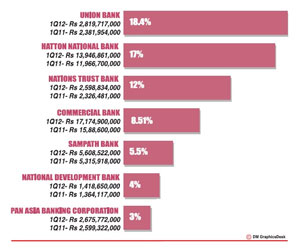Reply To:
Name - Reply Comment
 Despite an increasing trend in non-performing loans (NPLs) being recorded over the first quarter, the International Monetary Fund (IMF) has expressed confidence in the stability of Sri Lanka’s banking system.
Despite an increasing trend in non-performing loans (NPLs) being recorded over the first quarter, the International Monetary Fund (IMF) has expressed confidence in the stability of Sri Lanka’s banking system.
Speaking at a recent press conference, visiting IMF review mission chief, Dr. John Nelmes said, “There is a small issue in terms of nonperforming loans in the banking system but this is really a very small issue. Overall, the banking system remains sound, solid and well capitalized with a strong liquidity position.”
“To date, there has been a very small increase in NPLs. However, these are natural movements that you can expect to see in this macroeconomic environment,” he added.
 Nevertheless, Dr. Nelmes’ reassurances failed to put some analysts at ease, with speculation still circulating as to whether local banks will be as well insulated from impact of a spike in NPLs in the wake of February’s interest rate hike.
Nevertheless, Dr. Nelmes’ reassurances failed to put some analysts at ease, with speculation still circulating as to whether local banks will be as well insulated from impact of a spike in NPLs in the wake of February’s interest rate hike.
A rise in NPLs was recorded across the banking sector during the quarter with Union Bank of Colombo PLC recording the highest percentage increase in NPLs during the quarter, reaching a level of Rs.2.82 billion, 18.4% over the previous year. Hatton National Bank PLC recorded the second highest increase in NPLs year-on-year (YoY) at 17% to reach Rs.13.95 billion, whilst Nations Trust Bank’s NPLs accounted for Rs.2.60 billion, 12% over the previous year.
Meanwhile, Commercial Bank saw an 8.51% YoY increase in NPLs at Rs.17.2 billion. Sampath Bank saw its NPLs rise by 5.5% to Rs.5.61 billion, whilst the National Development Bank recorded a 4% increase to Rs.1.42 billion.
Pan Asia Banking Corporation recorded the lowest increase during the quarter with Rs.2.68 billion in NPLs, 4% over 2011's figures. According to analysts, hike in interest rates and slow down in economic growth will impact the ability of those who have drawn loans from banks.
Due to the loose monetary policy the country had been following, a lot of bank loans were taken for consumption. In fact, most of the credit went for motor vehicle purchasing, pushing Sri Lanka's private sector credit growth to new heights.